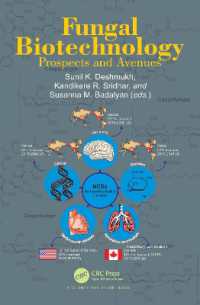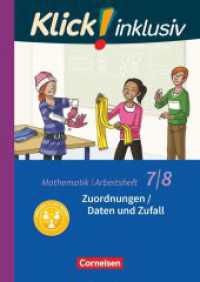- ホーム
- > 洋書
- > 英文書
- > Literary Criticism
Full Description
The Oxford English Literary History is the new century's definitive account of a rich and diverse literary heritage that stretches back for a millennium and more.
Each of these thirteen groundbreaking volumes offers a leading scholar's considered assessment of the authors, works, cultural traditions, events, and ideas that shaped the literary voices of their age. The series will enlighten and inspire not only everyone studying, teaching, and researching in English Literature, but all serious readers.
This book describes and seeks to explain the vast cultural, literary, social, and political transformations which characterized the period 1000-1350. Change can be perceived everywhere at this time. Theology saw the focus shift from God the Father to the suffering Christ, while religious experience became ever more highly charged with emotional affectivity and physical devotion. A new philosophy of interiority turned attention inward, to the exploration of self, and the practice of confession expressed that interior reality with unprecedented importance. The old understanding of penitence as a whole and unrepeatable event, a second baptism, was replaced by a new allowance for repeated repentance and penance, and the possibility of continued purgation of sins after death. The concept of love moved centre stage: in Christ's love as a new explanation for the Passion; in the love of God as the only means of governing the self; and in the appearance of narrative fiction, where heterosexual love was suddenly represented as the goal of secular life. In this mode of writing further emerged the figure of the individual, a unique protagonist bound in social and ethical relation with others; from this came a profound recalibration of moral agency, with reference not only to God but to society. More generally, the social and ethical status of secular lives was drastically elevated by the creation and celebration of courtly and chivalric ideals. In England the ideal of kingship was forged and reforged over these centuries, in intimate relation with native ideals of counsel and consent, bound by the law. In the aftermath of Magna Carta, and as parliament grew in reach and importance, a politics of the public sphere emerged, with a literature to match. These vast transformations have long been observed and documented in their separate fields. The Oxford English Literary History: Volume 1: 1000-1350: Conquest and Transformation offers an account of these changes by which they are all connected, and explicable in terms of one another.
Contents
General Editors' Preface
List of Figures
Note on Languages and Translations
Introduction
1. England c.1000: This World is in Haste
I: Violence in Crisis: Wulfstan and Ælfric Writing the Last Days
II: The Anglo-Saxon Chronicles: Writing what Was Lost
III: Meaning and Uncertainty: Interpreting History
IV: The Battle of Maldon: Asking Questions
2. Conquests, Kings, and Transformations
I: Visions and Dreams: Miracle Stories in Conquered England
II: Transformations 1: Return of the Warrior King
III: Transformations 2: Soul-Searching
IV: Chronicles of Post-Conquest Kingship
V: Paying Court: New Ideals in the World
3. Know Yourslef: Interiority, Love, and God
I: My Flesh Is Immune to All Corruption: Christina of Markyate's Certainty
II: The Self Enclosed: Guarding the Heart in the Ancrene Wisse
III: For who Is Richer than Christ?: The Love of God
IV: Conclusion: Selfhood without Individuality
4. The Bellator and Chevalerie: The Struggle for the Warrior's Soul
I: Chansons and Chronicles of Crusade: The Warrior's Entreaty
II: The Ordene de chevalerie and Roman des eles: Remaking Knighthood
III: Epic vassalage and Romance chevalerie: Knighthood Shaped by Narrative
IV: The Soldier's Sacred Oath: Knighthood and the State
V: Gui de Warewic: The Moral Claims of English Knighthood
VI: Sir Gawain and the Green Knight's Noble Device: An English Poet Criticizes chevalerie
5. It is Different with Us: Love, Individuality, and Fiction
I: Marie de France's Lais, Lancelot, and Other Lovers
II: Strange Love: Thomas of Britain's Tristan
III: 'What appears to all, this we call Being'
IV: The Four Degrees of Violent Love
6. Conversations with the Living and the Dead
I: King Arthur, from Geoffrey of Monmouth to Wace and Lazamon
II: The Lamentations of Mary: Feeling for Christ in Latin Prose and French Verse
III: 'Stond wel, morder, ounder rose': Lyrics of Passion
IV: The Mirror of the Church and The Owl and the Nightingale: Orthodoxy and Reality
V: The South English Legendary: Faith and Community
7. Engletere and the Inglis: Conflict and Construction
I: The Community of the Realm: A New Public Discourse
II: 'He dredden him so bhef doth clubbe': Power and Coercion in Havelok
III: The French and English Brut: Vernacular Writing and the Politicization of History
IV: Wynners and Defendours and Assaillours: Disorders of Society
V: Conclusion
Epilogue
Bibliography
Index








